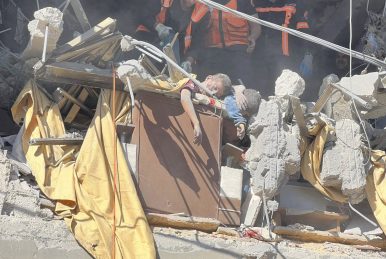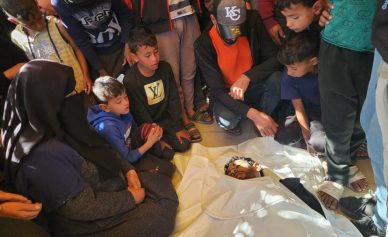GAZA, (PIC)
Since the start of the Israeli assault on Gaza on October 7 of last year, public reactions from both the Arab world and internationally have been overwhelmingly in support of Palestine and against the massacres carried out by the Israeli occupation army against civilians. This contrasts with official responses, which have ranged from unconditional support for Israel, in words and actions, to verbal sympathy for Gaza’s victims without any real action, and in some cases, complete silence, with no clear stance on either side.
The most notable feature of these protests is that they primarily took place in countries that support Israel and in a few Arab nations like Yemen, Jordan, Iraq, and Lebanon. However, they were absent in the UAE, Bahrain, and Saudi Arabia. In Egypt, a few small protests emerged briefly, supported by the ruling regime, but they were quickly halted and faded out before October had even ended.
In several Arab countries, protests erupted at the start of the war and continued for months. The most notable were in cities like Amman, Sanaa, and Baghdad, where large-scale events were held calling for the prosecution of Israeli Prime Minister Benjamin Netanyahu and Army Minister Yoav Gallant, the cessation of the aggression on Gaza, condemnation of U.S. and European support for Israel, and demands for aid to enter Gaza.
In the Maghreb, numerous protests took place in Mauritania, Morocco, and Algeria, demanding an end to the aggression, the lifting of the siege, the opening of Egypt’s Rafah crossing, and the severing of diplomatic relations with Israel. In Mauritania, a march in the capital Nouakchott called for ending the siege on Gaza.
In Western countries (which claim to uphold freedom of expression and the right to protest), demonstrations were sometimes met with police repression, and many protesters were arrested. This highlights the sharp divide between governments that support the aggressor and people who support the victim.
Over the past year of Israeli aggression on Gaza, global popular movements have recorded thousands of protests and events worldwide, including around 20,000 solidarity demonstrations in 18 European countries such as Germany, the Netherlands, France, Belgium, Switzerland, Spain, Italy, Sweden, Denmark, Ireland, and Austria.
These activities ranged from demonstrations, sit-ins, and protests to photo exhibitions and other forms of expression. In the first 30 days alone, 5 million people in the U.S. and Europe demonstrated against the Israeli aggression on Gaza and called for humanitarian aid to be sent to the besieged territory.
During the initial phase of the conflict, starting with the “Al-Aqsa Flood” offensive and continuing through the end of October, there were a few pro-Israel demonstrations in parts of Europe and the U.S. However, these diminished over time, especially after international institutions and courts condemned Netanyahu’s government for committing war crimes against civilians, weakening the position of Israel’s supporters.
Another significant development was the shift in public opinion, with increasing opposition to Israel and growing support for Palestinian rights and condemnation of the attacks on Gaza’s population. This shift even saw Jewish groups in some countries joining protests against the occupation.
For the first time, European cities witnessed a massive wave of pro-Palestinian support. Protests would often begin in the capital cities and quickly spread to other areas, as seen in France, Germany, Italy, and the UK. This created an uncomfortable situation for governments that traditionally express support for Israel’s actions against Gaza. They responded by suppressing protests and issuing bans on any expressions of support for Palestine or opposition to Israel, an unprecedented move in modern European history. This widened the gap between civil society and governments, which appeared increasingly out of touch with public sentiment and seemed more like spokespeople for Netanyahu’s government.
In the U.S., the protests were particularly prominent, and support for Gaza was widespread, creating major headaches for the American administration (Israel’s biggest backer) and disrupting its calculations. The protests were large, rapidly spreading, and had specific demands that the U.S. government struggled to accommodate. As a result, the administration began to turn away from its usual defense of free speech and the right to protest, adopting repressive measures against demonstrators.
As the war entered its sixth month, American universities became centers of protest, with demonstrations, sit-ins, and even campus closures. These included Northeastern University in Boston, Washington University in St. Louis, Missouri, the University of Southern California, Harvard University, and the University of Pennsylvania. Protesters demanded that the U.S. government stop supporting Israel, end the aggression on Gaza, provide humanitarian aid to the besieged territory, and cease all university ties with Israeli institutions.
The U.S. administration responded to these protests with hostility, suppressing many demonstrations, expelling students, and even punishing professors who supported the protests by either firing them or referring them for investigation or arrest. This fueled further protests across more universities.
Student protests weren’t confined to U.S. cities; they spread to universities across Europe, with the intensity matching what occurred in American universities. At the University of Oxford in the UK, sit-ins were held demanding the university divest from companies supporting Israel, with hundreds of professors and human rights organizations joining the cause.
At the Sorbonne in France, wide-ranging activities were met with the arrest of dozens of students following sit-ins demanding that the university cut all academic ties with Israeli institutions. Protesters chanted against the complicity of French universities with Israel’s crimes against the Palestinian people and accused the West of betraying the values of justice and democracy by being complicit in what they described as genocide against Palestinians in Gaza and the West Bank.
Similar protests were held at universities in Denmark, Norway, Spain, Belgium, and Germany, all calling for an end to Israel’s assault on Gaza and a comprehensive international boycott of Israeli universities.
As a full year of Israeli aggression on Gaza passes, protests in American and European cities continue, with a variety of activities condemning Western policies that refuse to denounce Israeli war crimes against the Palestinian people in Gaza and the West Bank. These protests have played a significant role in pressuring some governments to reduce their unconditional support for Israel and, at least verbally, call for an end to the assault on Gaza and push for a ceasefire agreement.














